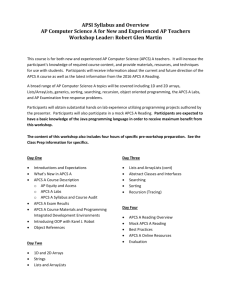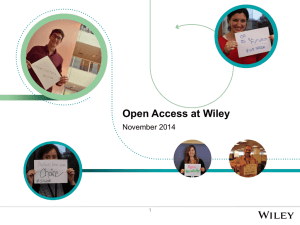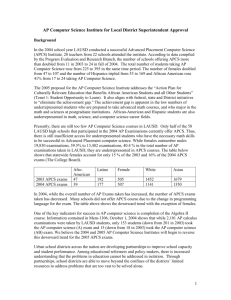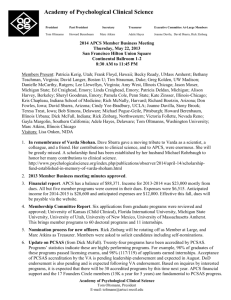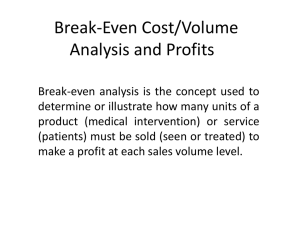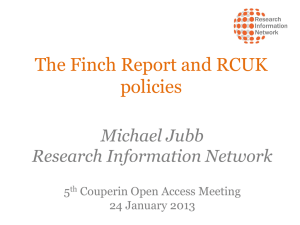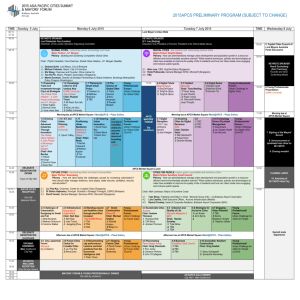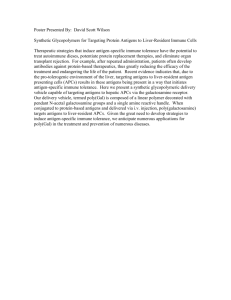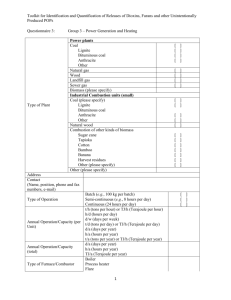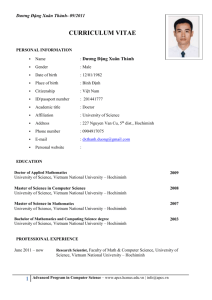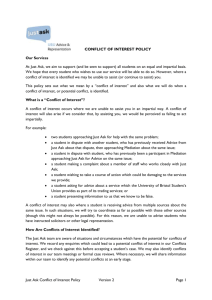Masters Of Arts In Peace And Conflict Management Course
advertisement
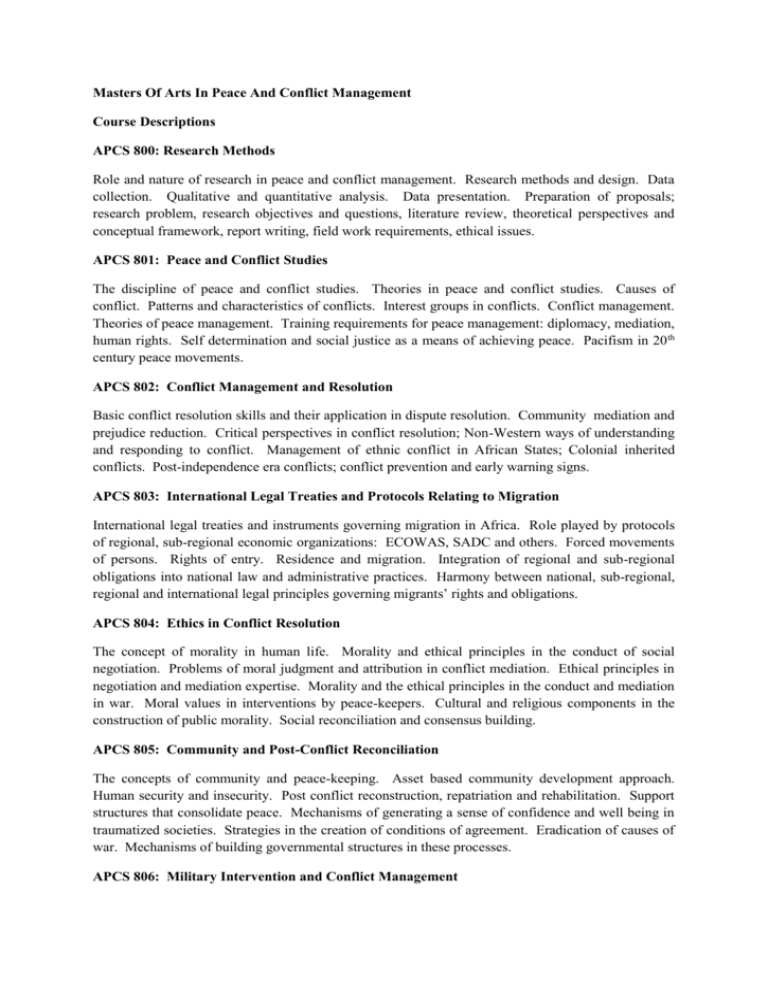
Masters Of Arts In Peace And Conflict Management Course Descriptions APCS 800: Research Methods Role and nature of research in peace and conflict management. Research methods and design. Data collection. Qualitative and quantitative analysis. Data presentation. Preparation of proposals; research problem, research objectives and questions, literature review, theoretical perspectives and conceptual framework, report writing, field work requirements, ethical issues. APCS 801: Peace and Conflict Studies The discipline of peace and conflict studies. Theories in peace and conflict studies. Causes of conflict. Patterns and characteristics of conflicts. Interest groups in conflicts. Conflict management. Theories of peace management. Training requirements for peace management: diplomacy, mediation, human rights. Self determination and social justice as a means of achieving peace. Pacifism in 20 th century peace movements. APCS 802: Conflict Management and Resolution Basic conflict resolution skills and their application in dispute resolution. Community mediation and prejudice reduction. Critical perspectives in conflict resolution; Non-Western ways of understanding and responding to conflict. Management of ethnic conflict in African States; Colonial inherited conflicts. Post-independence era conflicts; conflict prevention and early warning signs. APCS 803: International Legal Treaties and Protocols Relating to Migration International legal treaties and instruments governing migration in Africa. Role played by protocols of regional, sub-regional economic organizations: ECOWAS, SADC and others. Forced movements of persons. Rights of entry. Residence and migration. Integration of regional and sub-regional obligations into national law and administrative practices. Harmony between national, sub-regional, regional and international legal principles governing migrants’ rights and obligations. APCS 804: Ethics in Conflict Resolution The concept of morality in human life. Morality and ethical principles in the conduct of social negotiation. Problems of moral judgment and attribution in conflict mediation. Ethical principles in negotiation and mediation expertise. Morality and the ethical principles in the conduct and mediation in war. Moral values in interventions by peace-keepers. Cultural and religious components in the construction of public morality. Social reconciliation and consensus building. APCS 805: Community and Post-Conflict Reconciliation The concepts of community and peace-keeping. Asset based community development approach. Human security and insecurity. Post conflict reconstruction, repatriation and rehabilitation. Support structures that consolidate peace. Mechanisms of generating a sense of confidence and well being in traumatized societies. Strategies in the creation of conditions of agreement. Eradication of causes of war. Mechanisms of building governmental structures in these processes. APCS 806: Military Intervention and Conflict Management Forms of conflict. Multinational coalitions and conflicts. Terrorism: chemical, biological and nuclear agents. Civil war and collapsed state conflicts. Impact of modern warfare on the environment. Forms of conflict management. Mutual vulnerability and peace-building. Integration of systemic perspective. APCS 807: Social and Economic Insecurity Socio-economic crises. Globalization and socio-economic crises. Economic restructuring. Global crises and policy making decisions. Human security issues. Social reconstruction strategies for translating peace-building into public policy. APCS 808: Management in Conflict Situation Concepts of war trauma. War trauma and combatants, civilians and other vulnerable groups. Conditions of life in prisoners of war (POW), internally displaced persons (IDPS) or refugee camps. Displacement theories and coping mechanisms used as part of the strategy for managing war trauma. Development of strategic framework for peace-building. Funding agencies. National and international peace-building leadership and organizations. Application of frameworks and practice of professional skills. Challenges and dilemmas of peace-building. APSC 809: Peace and International Politics Meta-theory and analysis. Philosophical issues in international politics. Theoretical approaches in the social sciences to the study of international affairs. Contemporary approaches to security and peacebuilding, social movements and their stakes in peace. States as agents of peace. APCS 810: Initiatives in Peace Building in Africa Peace initiatives in the African traditional setting; pre-negotiation, negotiation, post-negotiation. Mediation of conflicts in an African setting. Ideology and ritual practice in peace making. Legal structures and the peace process. Initiative and leadership in the African conflict situation, principles and values of negotiation. APCS 811: Humanitarian Intervention Humanitarian crises and emergencies. Human rights and international humanitarian law. Doctrine of military humanitarianism. International, regional and sub-regional dimensions. Emergent humanitarian actors: donors, non-governmental organizations (NGOs), private campanies and military establishments. Case studies to include ‘operation provide comfort’ in Iraq, ‘Restore hope in Somalia’, ECOWAS in Liberia and Sierra Leone, UN Peace-keeping mission in Bosnia. Genocide and the crises of the state. The special needs and vulnerable groups in armed conflict. Approaches and methods of providing concrete support for war victims. APCS 812: Women in Peace-building and Reconciliation Theoretical perspectives. Women as advocates of peace. Women participation in peace agreements. Role in rehabilitation and healing. As counselors. Women as health care givers. Women and sociocultural transformation. Transforming gender imbalance. Challenges of women in peace-building and reconciliation processes. Equipping women with techniques of peace building and reconciliation. APCS 813: Children and Youth in Peace Building Theoretical perspectives. Children and youth as stakeholders in peace-building. Children and youth as resources in community peace building. Children in war. Children’s participation in disarmament, demobilization and re-integration. Vocation and re-integration. Vocational training thematic perspectives. APCS 814: Research Project (4 units) Students develop, execute and present a research project as a culminating component of the masters’ programme, in consultation with a faculty member. APCS 815: Thesis Governed by Kenyatta University examination regulations. APCS 816: Arms Control and Proliferation Definitions. Causes and consequences of arms racing. Theory and practice of arms control. Nuclear, chemical and biological weapons proliferation and arms control issues in Europe, Middle East and Korea. Non-proliferation regimes and organizations. Non-proliferation tools. Weapons of mass destruction.
